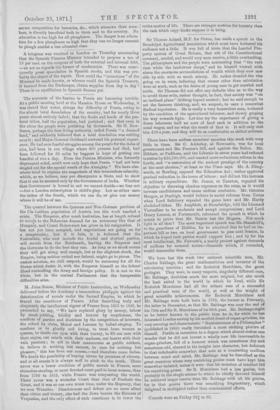There have been endless members' speeches this week with very
little in them. Sir C. Adderley, at Newcastle, was for local government and Mr. Forster'e Bill, and against the Ballot. Mr. Hibbert, at Padiltam, said the Liberals in seven years had reduced taxation by £25,790,000, and wanted more reductions, reform in the Lords, and "a restoration of the ancient prestige of the country at the next election," at least so the Times says. Mr. A. fling- worth, at Bowling, opposed the Education Act ; rather approved gradual reduction in the hours of labour ; and did not like increase in military expenditure. Mr. James, at Taunton, repeated his objection to throwing election expenses on the rates, as it would increase candidatures and cause endless confusion. Mr. Osborne Morgan, at Denbigh, would believe iu social reforms from Tories when Lord Salisbury repealed the game laws and Mr. Hardy abolished tithes. Mr. Amphlett, at Stourbridge, told the Licensed Victuallers to be moderate and accept compromises ; and Lord Henry Lennox, at Portsmouth, rehearsed the speech in which he means to prove that Mr. Baxter lost the Megaara. Not much light in all that? The most important speech was Mr. Stansfeld's, to the guardians of Halifax, for he admitted that he had an im- portant bill or two on local government to pass next Session, in which he hoped both parties would support him ; and by far the most intellectual, Mr. Fawcett's, a manly protest against demands of millions for untaxed voters—demands which, if conceded, would demoralize them.


































 Previous page
Previous page